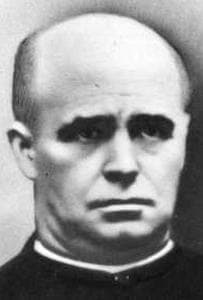
Blessed Jacinto Blanch Ferrer
Blessed
Feast Day: August 21
Birth: April 27, 1868
Death: August 1, 21
Biography
Blessed Jacinto Blanch Ferrer, also known as Father Jacinto Blanch Ferrer, was born on 27 April 1868 in Vilanova de Sau, Barcelona, in the diocese of Vic, Spain. He came from a devout and large family, with all of his siblings eventually entering religious life, five of them becoming Claretian Missionaries.
Jacinto's deep faith and dedication to the Catholic Church led him to make his First Communion at the age of 12 and join the Claretian Missionaries' novitiate in Vic, Spain, at the age of 16, on 21 July 1884. He received his education in Vic and Santo Domingo de la Calzada, and on 18 September 1885, he made his profession in the Claretian order. After completing his studies, he was ordained a priest in the diocese of Zaragoza, Spain, on 12 March 1892.
Although not initially noted for his scholarly abilities, Father Jacinto possessed immense practical skills. He was assigned to teach Latin and soon developed eloquence in speech, allowing him to deliver powerful sermons in various Spanish cities over the years.
In the early 20th century, Spain experienced a wave of anti-Catholic violence. Father Jacinto took courageous initiatives to protect the faith and help those in danger. He convinced local nuns to wear street clothes instead of religious habits to avoid persecution, enabling them to carry out their charitable work. Additionally, Father Jacinto engaged in covert ministry, ministering to those who feared practicing their faith openly. He even approached anti-Catholic mobs to dissuade them from burning churches. Unfortunately, his efforts couldn't prevent the burning of his own church and community house in Barcelona in 1909. Jacinto was chosen as the superior of the community and oversaw its reconstruction between 1911 and 1913.
Later, Father Jacinto became the superior of the Claretian community in Sallent, Spain, in 1920. During his leadership, he oversaw the re-construction of the entire infrastructure of the community.
Apart from his devotion to the Eucharist, the Blessed Virgin Mary, and the Rosary, Father Jacinto was a devoted student and follower of Father Anthony Mary Claret, the founder of the Claretian Missionaries. He actively served as the Vice-Postulator for the Cause of Canonization of Saint Anthony Mary Claret and Father Francesc Crusats Franch from 1916 to 1936. Father Jacinto also published a bibliographic study on the life and work of Father Claret.
When the Spanish Civil War intensified, Father Jacinto took refuge in the house of Don Eugenio Bofill, where he continued his clandestine ministry. Despite the dangers, he celebrated Mass in private homes, instructed fellow Claretians, heard Confessions, taught catechism, and led groups in praying the Rosary. However, on 19 August 1936, fearing that his work and visitors would jeopardize the Bofill family, he moved out. Sadly, on 21 August 1936, Father Jacinto was apprehended by militia forces. The exact details of his last two days remain unknown, but he was executed on 21 August on the grounds of being a priest, thus becoming a martyr for his faith.
Following his execution, Father Jacinto was buried in a niche in the Bofill family mausoleum in the All Saints cemetery. His remains were later buried in a common grave, making the identification and recovery of relics impossible.
In recognition of his martyrdom, Pope Francis declared Jacinto Blanch Ferrer as venerable on 21 December 2016. Later, on 21 October 2017, Pope Francis beatified Father Jacinto, honoring his courageous witness to the faith. The beatification recognition was celebrated in the Basilica of Sagrada Familia in Barcelona, Spain, presided by Cardinal Angelo Amato.
Blessed Jacinto Blanch Ferrer's life serves as a shining example of a devoted priest who fearlessly worked to spread the faith, provided spiritual guidance, and protected the Church in the face of persecution during a tumultuous period in Spain's history.